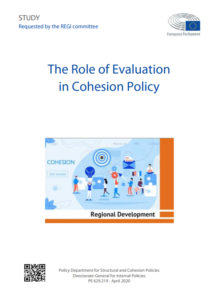
The study provided to provide the European Parliament with a critical analysis of the current rules governing the evaluation of Cohesion Policy (CP) and how they are implemented at the EU and Member State level.
Over the years, the European Commission has established an ambitious framework for evaluating Cohesion Policy with the aim of raising quality standards and harmonising practices and approaches. This framework comprises rules enshrined in regulations, guidance documents and a series of soft support instruments providing methodological and operational indications. The study looks at how effective is this framework in achieving the multiple objectives assigned to Cohesion Policy and documents advancements at EU level. The research shows that the findings from ex-post evaluations are feeding into the policy process EU level even if this needs to be more systematic and generalised.
This study comes at a critical juncture when the Cohesion Policy’s post-2020 budget is likely to be reduced, and the regulations defining the basis of the policy are still being negotiated. In this context, the study invites the European Parliament to adopt a more proactive approach to promote Cohesion Policy evaluation. It is ideally placed to advance policy dialogue around key political issues at the EU level by using evidence from evaluations, among other sources. It formulates a critical analysis of whether and how policymakers have used evaluation findings at the EU and national/regional level.
The final report relies on a methodological approach combining different tools, including a literature review, interviews with relevant stakeholders, an online survey and six case studies conducted in a sample of Member States, accounting for a wide diversity of situations.
The study is available online, with the executive summary translated in French, German, Italian and Spanish.